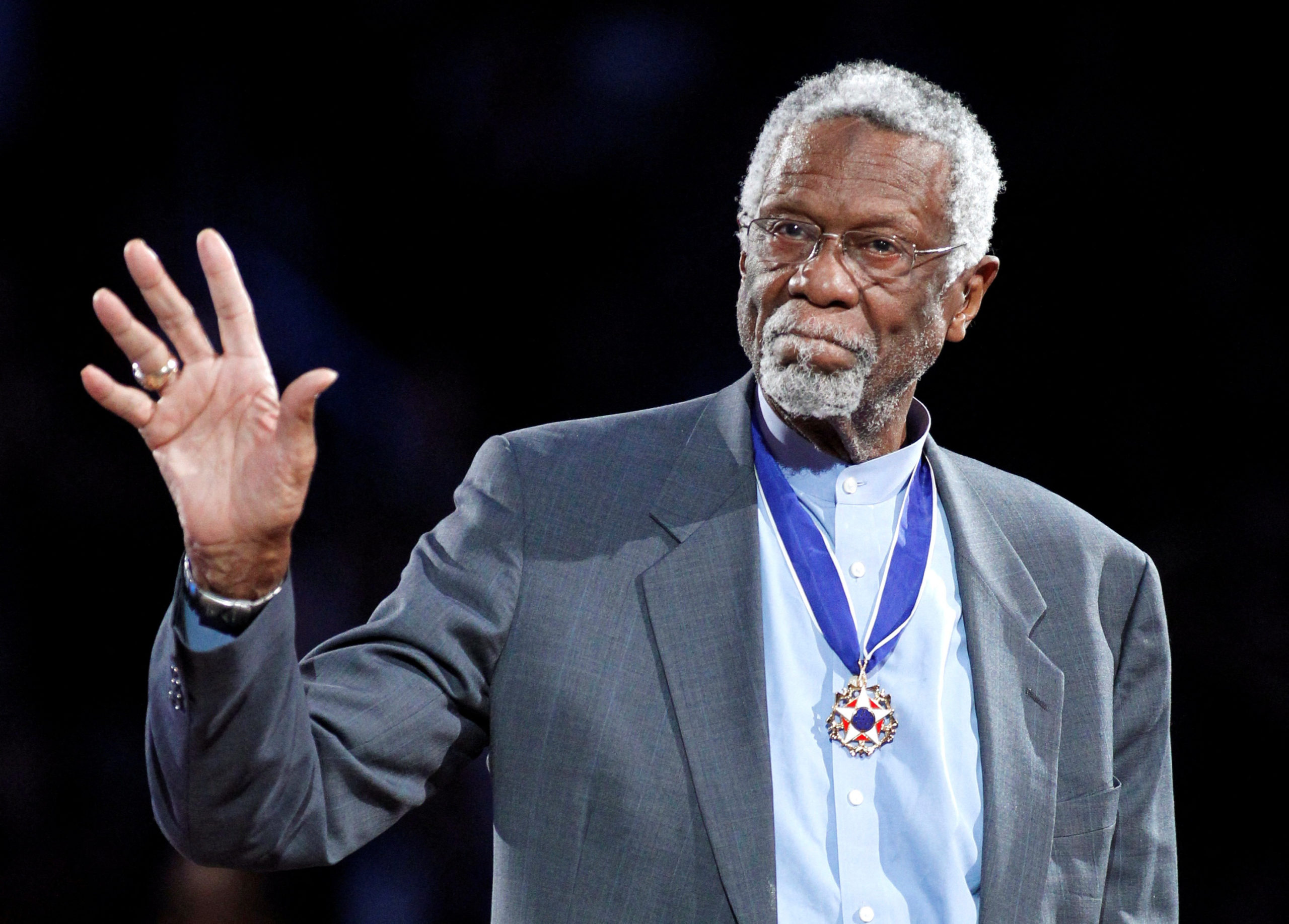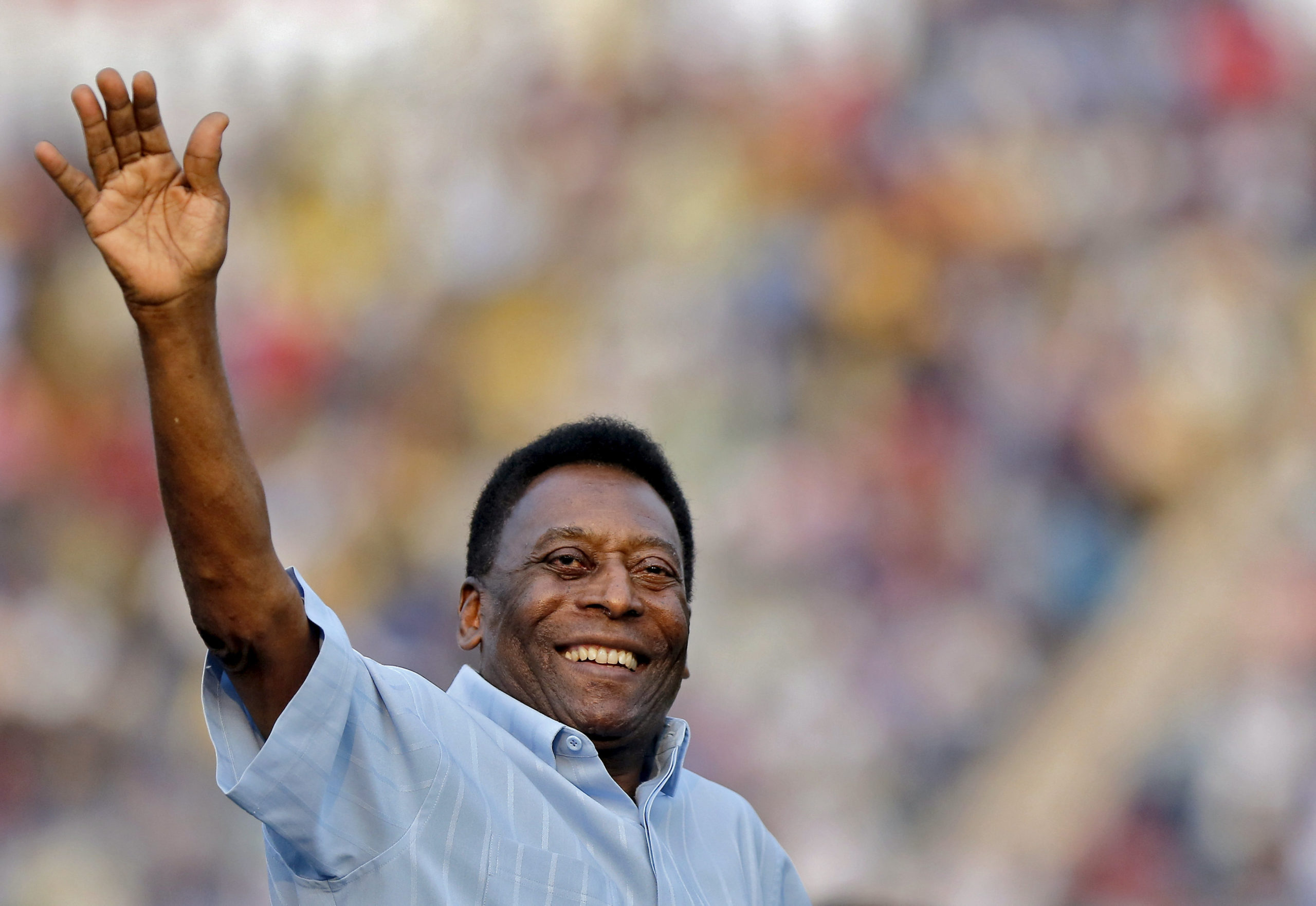Final farewells: Deaths in sport in 2022
Pele, Shane Warne and Bill Russell — just three sports icons who passed away in 2022.
AFP Sport looks at their legacies as well as nine other high-profile sports stars to have died over the last year:
BASKETBALL
Bill Russell — Died aged 88 on July 31

FILE PHOTO: Boston Celtics’ legend Bill Russell stands with his Presidential Medal of Freedom during the NBA All-Star basketball game in Los Angeles, February 20, 2011. REUTERS/Danny Moloshok/File Photo
— He won a record 11 NBA crowns as a cornerstone of a Boston Celtics dynasty, overcame racism to become the league’s first Black superstar and was a prominent civil rights activist.
He was the first Black coach to win the NBA Finals. That triumph came in 1968, especially poignant as it was just weeks after civil rights leader Martin Luther King’s assassination.
“A good man and great American who did everything he could to deliver the promise of America for all Americans,” said US President Joe Biden.
BOXING
Earnie Shavers — Died aged 78 on September 1
— “Earnie hit me so hard it shook my kinfolk in Africa,” remarked Muhammad Ali after their 1977 heavyweight world title bout which Ali won after 15 pulsating rounds.
One of 10 children, Shavers’ family fled Alabama under threats from the Ku Klux Klan. He only took up boxing in his early 20s but his fearsome punch left not just Ali in awe.
“I was in the land of make-believe. I heard saxophones and trombones sounding in my ear… I saw little blue rats scamper out to smoke cigars, drink whisky, man,” said another opponent, James ‘Quick’ Tillis.
CRICKET
Shane Warne — Died aged 52 on March 4
— Regarded by many in sports-mad Australia as second only to Don Bradman, Warne mixed legendary cricket deeds with colorful headlines away from the pitch earning him the nickname ‘Hollywood’ in a career as bewitching as his famed wrong ‘un.
Warne took 708 wickets in a 145-Test career. “I should think there have been a lot of great cricketers, great spinners and great leg-spinners but Warnie will always be, certainly from my point of view, the No. 1,” said Mike Gatting, who was at the wrong end of Warne’s ‘ball of the century’ in 1993.
Rod Marsh — Died aged 74 on March 4
— A flamboyant Australian wicketkeeper — nicknamed ‘Iron Gloves’ — he made his international debut in 1970 against England before retiring in 1984 with what was then a world-record 355 Test dismissals, 95 off the bowling of Dennis Lillee.
He was no mean batsman either becoming the first Aussie wicketkeeper to score a Test century, against Pakistan in 1982.
FOOTBALL
Pele – Died on December 29 aged 82

FILE PHOTO: Legendary Brazilian soccer player Pele waves to the spectators before the start of under-17 boys’ final soccer match of Subroto Cup tournament at Ambedkar stadium in New Delhi, India, October 16, 2015. REUTERS/Anindito Mukherjee/File Photo
— The Brazilian superstar whose name became synonymous with his sport, “O Rei” (The King) is the only footballer in history to win three World Cups — 1958, 1962 and 1970.
Known for his genius with the ball, he epitomized the sublime style of play called “samba football” in Brazil, where he was declared a “national treasure.”
Pele scored an all-time record 1,281 goals in 1,363 matches for Santos (1956-74), the Brazilian national team, and the New York Cosmos (1975-77).
“Football has lost the greatest player in its history,” said German legend Franz Beckenbauer.
George Cohen – Died on December 23 aged 83
— The 37-times capped defender played every minute of England’s victorious 1966 campaign that culminated in a 4-2 extra-time win over the then West Germany to give England their first and only World Cup.
Cohen spent his entire career with Fulham, playing 459 games for the Cottagers from 1956-1969 before a knee injury cut short his career at 29.
Uwe Seeler – Died on July 21 aged 85
— Played in all four World Cups in which Pele appeared (1958-70) but unlike the Brazilian legend never lifted the trophy. The closest he came was captaining the side that lost to England in the 1966 final.
Like his father, Seeler played for Hamburg from 1953 to 1972 where he is referred to fondly as ‘Uns Uwe’ (Our Uwe) making 476 appearances.
NFL
Dan Reeves — Died on January 1 aged 77
— The bespectacled coach shares with Buffalo Bills legendary coach Marv Levy and Minnesota Vikings’ Bud Grant, the most visits to a Super Bowl without ever winning (four).
Ironically his last trip to the Super Bowl in 1999 resulted in the Broncos (who he had taken three times to the Super Bowl) beating his Atlanta Falcons. He did win one Super Bowl ring – as a running back for the Dallas Cowboys.
RACING
Lester Piggott — Died on May 29 aged 86
— For many the greatest jockey of all time. Known as the ‘Long Fellow’, he rode a record nine Epsom Derby winners.
Piggott, who rode his first winner aged just 12, served a year in prison for tax fraud in 1987 and then made a shock return to riding.
He memorably reunited with Irish trainer Vincent O’Brien to win the prestigious Breeders’ Cup Mile on Royal Academy at the age of 54 in 1990.
“Lester walked about with an aura about him,” said his great rival Willie Carson.
RUGBY UNION
Phil Bennett – Died on June 12 aged 73
— Considered to be the finest fly-half to play for Wales, pivotal to the country’s glory years during the 1970s who became a cult figure due to a grievance-laced pre-match speech before facing England, the old enemy, in Cardiff in 1977.
“Look what these bastards have done to Wales. They’ve taken our coal, our water, our steel. They buy our homes and live in them for a fortnight every year. What have they given us?” he said.
“Absolutely nothing. We’ve been exploited, raped, controlled and punished by the English – and that’s who you are playing this afternoon,” said Bennett. Wales won 14-9.
RUGBY UNION/LEAGUE
Va’aiga Tuigimala — Died on February 24 aged 52
— Affectionately known as ‘Inga the winger’ to fans of both rugby union and rugby league, he played for the All Blacks in union and Samoa in both codes. He was also a member of the Wigan side that dominated rugby league in the 1990s.
TENNIS
Nick Bollettieri — Died on December 4 aged 91
— Legendary coach who helped develop superstars such as Andre Agassi and Maria Sharapova.
The demanding routine for children and adolescents living and training at the Korean War veteran’s academy produced results but also drew criticism.
“I hated it at Bollettieri’s academy,” said Agassi. “The only way I could get out was to succeed.”
Bollettieri, though, remained unrepentant. “I did what had to be done. Tennis is not a sport for choirboys.”